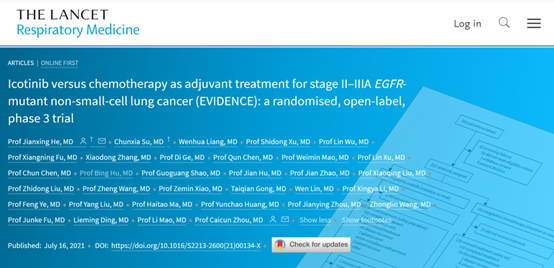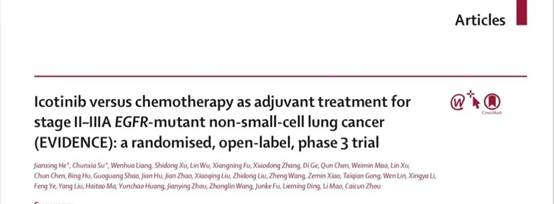
On July 17, Beijing time, the results of the EVIDENCE research, a multicenter, randomized, open, phase III clinical study of icotinib versus standard adjuvant chemotherapy for postoperative adjuvant treatment of stage II-IIIA non-small cell lung cancer with EGFR sensitive mutation, led by Professor ZHOU Caicun, director of the Cancer Institute of Tongji University School of Medicine and Affiliated Shanghai Pulmonary Hospital, were published online in the international top academic journal The Lancet Respiratory Medicine.

The EVIDENCE research was the first registered clinical study in the field of postoperative adjuvant therapy for non-small cell lung cancer in China. It was jointly led by ZHOU Caicun and HE Jianxing, president of the First Affiliated Hospital of Guangzhou Medical University. A total of 29 centers participated in the study for six years, and 322 subjects with EGFR mutation positive after stage II-IIIA surgery were randomly divided into two groups as 1:1. The experimental group was given EGFR-TKI icotinib 125mg TID orally for 2 years, and the control group was given vinorelbine / cisplatin or pemetrexed / cisplatin chemotherapy as standard adjuvant chemotherapy for 4 cycles, followed up until recurrence, intolerance or death. The primary end point was disease-free survival (DFS), and the key secondary end points were 3-year and 5-year DFS survival, OS and safety.

The results show that the efficacy of icotinib in postoperative adjuvant therapy for patients with EGFR gene sensitive non-small cell lung cancer (NSCLC) was significantly better than standard adjuvant chemotherapy. Postoperative adjuvant targeted therapy significantly prolonged the DFS and had better safety. The median time of disease-free recurrence in the adjuvant targeted therapy group was 47.0 months and that in the standard adjuvant chemotherapy group was 22.1 months (HR = 0.36, 95% CI 0.24-0.55, P < 0.0001). According to the clinical characteristics of DFS, the analysis of each subgroup showed that the adjuvant targeted therapy group was better than the standard adjuvant chemotherapy group. The 3-year DFS rates of adjuvant targeted therapy group and standard adjuvant chemotherapy group were 63.9% and 32.5%, respectively. In terms of safety, the incidence of adverse reactions in the adjuvant targeted therapy group was significantly lower than that in the standard adjuvant chemotherapy group, and the incidence of grade 3 and above adverse events was 11% vs 61%. The common adverse reactions in the adjuvant targeted therapy group were rash, while those in the standard adjuvant chemotherapy group were gastrointestinal reactions, such as nausea, vomiting and hematological toxicity.
Prof. ZHOU Caicun gave an oral report of the study at the World Lung Cancer Conference (WCLC) held from January 28 to 31 this year, which attracted wide attention from the participants. Professor Zhou Caicun was the corresponding author of the article published this time, and He Jianxing and Associate Professor Su Chunxia, deputy director of the oncology department of the Affiliated Shanghai Pulmonary Hospital, were the co-first authors.
The results of the EVIDENCE research showed that icotinib was an "efficient and low toxicity" way of postoperative adjuvant therapy for NSCLC patients with EGFR sensitive mutation, and also provided an important evidence-based basis for postoperative adjuvant therapy for NSCLC with EGFR sensitive mutation.
As the first registered clinical study of postoperative adjuvant targeted therapy in the field of NSCLC, the EVIDENCE research provided high-level evidence-based medicine for the approval of adjuvant therapy indications of icotinib. The highlight of the EVIDENCE study was that the enrolled patients were all patients with stage II-IIIA EGFR sensitive mutation after operation, which was a patient group with high probability of postoperative recurrence. Prof. ZHOU Caicun said that this study was a multi-center registered clinical study for Chinese people. Therefore, the success of this study was very important for Chinese lung cancer patients, because it was the data from Chinese, the test results were fully applicable to Chinese's physique and were of great significance to the clinical practice and adjuvant treatment of Chinese lung cancer patients in the future.
On June 1, NMPA issued an approval document, and the new indications for postoperative adjuvant therapy of icotinib completed according to this study were approved for listing.
Industry experts said that the publication of the EVIDENCE research results in The Lancet Respiratory Medicine marked that the clinical research ability of Chinese researchers represented by Prof.ZHOU Caicun in the field of treatment of related diseases had reached the international advanced level, further confirmed the effectiveness and safety of the treatment method in the adjuvant treatment stage, and expanded the scope of indications of EGFR-TKI. It enhanced the international popularity and influence of the research team led by Chinese experts. At present, icotinib has been approved for postoperative adjuvant indications, and it is expected to benefit more Chinese patients.
